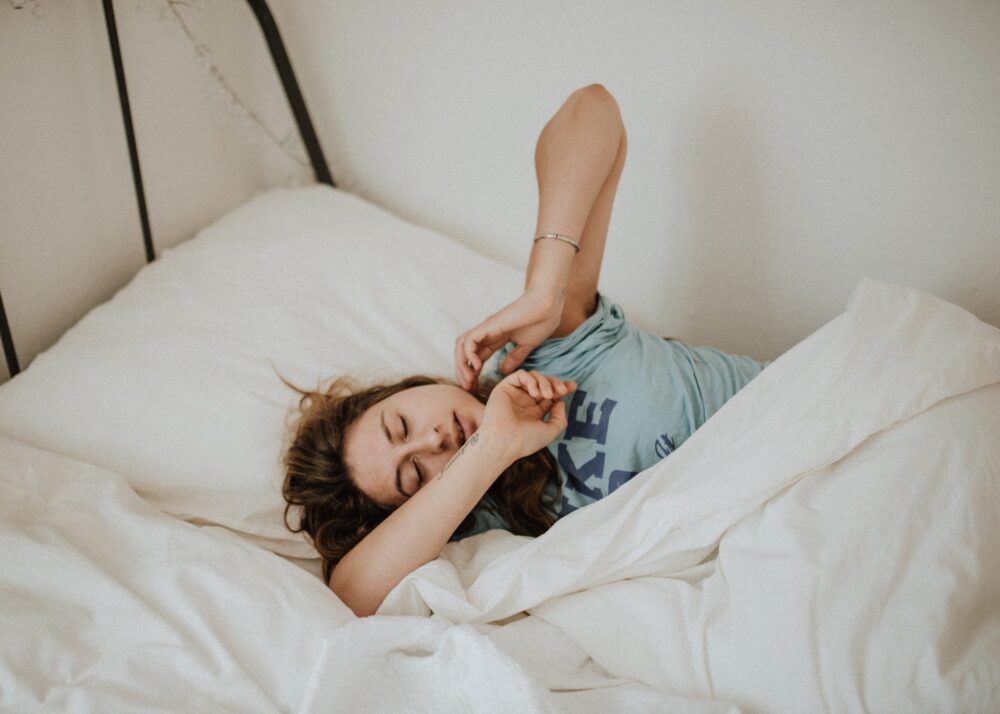
If you have woken up tired, with the mind already racing about problems to deal with during the day, like many people, you may be experiencing high anxiety in the morning.
Anxiety is common, and to be expected, but when it affects your health it is time to take action.
Why is anxiety worse in the morning?
Everyone has woken up with high anxiety in the morning at some point and is more common in people who have Generalized Anxiety Disorder (GAD). Often, the expectations of the day can cause anxiety before getting out of bed. Feelings of anxiety about upcoming social events, work deadlines, finances, and childcare for the family are often cited as reasons.
If you chronically experience excessive feelings of anxiety for months on end you may have GAD and should speak with a physician about treatment.
What are the symptoms of morning anxiety?
Symptoms of anxiety can include one or more physical or mental states upon waking up. Typically they can be feelings of restlessness and being on edge, but may also include:
- Elevated heart rate associated often increased jitteriness
- Increased blood pressure
- Worrying about the day before you even get out of bed
- Exhaustion and fatigue in the morning
- Rapid breathing
- Waking up with anxious thoughts
Experiencing these anxiety symptoms in the morning can be debilitating, and if this is a common occurrence may indicate presence of anxiety disorder. Below are some recommendations for dealing with morning anxiety.
Why is anxiety high in the morning and what are the causes?
1. Elevated stress hormones in the morning, such as cortisol
One of the most common culprits of morning anxiety is elevated cortisol levels, commonly referred to as cortisol awakening response (CAR). Cortisol is known as the “stress hormone” and your body is programmed to increase its levels as part of its natural circadian rhythm. In fact, studies show that cortisol can be over 200% higher in the morning than in the evening.
2. Coffee and caffeinated beverages can lead to increased anxiety
Consumption of coffee and caffeinated beverages are common morning routines, but have been associated with higher levels of cortisol. In this crossover study in healthy men, ingestion of caffeine was found to prevent the normal decrease in cortisol levels 60 minutes after consumption.
Enjoy a coffee in the morning, but if you notice that multiple cups start to put you on edge, it may be time to try a caffeine-free beverage.
3. Poor breakfast nutrition
After a night of sleeping your body may have low blood sugar, and will typically need a healthy breakfast with high amounts of nutrients.
Doctors often recommend a breakfast that is high in magnesium to help with anxiety. Some common breakfast foods that are high in magnesium are:
- Roasted almonds
- Whole flaxseed
- Shredded wheat
- Milk and yogurt
- Raw avocado
4. Sugar and carbs as a stimulant
Excess sugar at breakfast can be a common cause of anxiety in the morning since your insulin spikes very quickly after ingestion. Often, anxiety can be caused by this spike and drop in blood glucose levels as your body goes from low to high to low glucose in the morning. This can elicits feeling of fatigue, putting you on edge as you start the day
5. Generalized anxiety disorder
People with chronic morning anxiety may have a general anxiety disorder, which is diagnosed by a professional healthcare provider.
If you experience chronic morning anxiety and often feel anxious without relief, it may be important to seek help from your physician.
How to prevent morning anxiety and self-care strategies
Waking up with anxiety makes it very difficult to start your day off with healthy habits. Often it takes a lot of effort to get out of bed, and in the mindset to have a great day. Setting a good routine can help to get in the right mood and have a great day.
- Eat a good breakfast: Getting the right nutrition from the start can have a significant impact on your body and mind. Avoiding high sugar cereals and drinks, and getting plenty of protein, good fats such as eggs and olive oil, and quality carbs like oatmeal has been reported to help.
- Reduce caffeine consumption: As mentioned above, too much caffeine can significantly impact anxiety, especially when it wears off. Try reducing the caffeine amount in the morning for a couple of days and see how you feel.
- Short exercise routines: If you don’t have the time for a full workout, a short routine like a 10 minute walk or full body stretching can help reduce anxiety and get your mind in a healthy place. In this placebo controlled study of postmenopausal women, increased weekly walking improved both anxiety and insomnia. Another great option for treating morning anxiety is to include some Yoga exercises in your wake up routine. Many studies have tested the mental health benefits of moderate yoga to help decrease anxiety and improve mental well-being. Physical activity is one of the most potent activities you can add to your daily routine to prevent anxious thoughts in the morning.
- Limit your screen time: In today’s environment often the first thing we do is turn to our phones to get the news of the day and check social media. This allows the outside world to control the initial state of your mind instead of you taking control of your own thoughts.
- Short meditation: Meditation work has shown to be a great way to improve mental health, especially for those with high anxiety. This study found that starting the day with 5 minutes of meditation improved mental health of those in the professional healthcare field.
- Improve your sleep: The benefits of good sleep on mental health have been well studied. Significant improvement of sleep hygiene, such as going to bed early, stopping caffeine intake in the afternoon, and no screen time an hour before bed are known to help those who struggle with insomnia. Waking up early at a consistent time often helps as well, since it is crucial to set a good sleep cycle that your body can rely on. Many people with anxiety disorders have problems with getting good sleep. This includes falling asleep and staying asleep. On average, you should aim for 7-9 hours of sleep depending on what feels best for you.
- Supplements: Many people have found different supplements are beneficial for helping with anxiety. These include CBD, CBDA, magnesium, ashwagandha, and L-theonine. If you decide to take supplements it is important to talk with your physician if you have any liver complications or are on medications.
- Breathing exercises: Morning anxiety can manifest as shortness of breath and rapid breathing, a classic sign of stress. Breathing exercises that focus the mind on controlling your breathing rate can help take your mind off the thoughts that make you anxious. This study in mothers who care for children with special needs found that three sessions a week of breathing exercises reduced anxiety, and increased sleep quality. Deep breathing has been used for many years, and is an easy to incorporate practice with a proven track record.
- Create time for yourself in the morning: Have you woken up, felt tired and hit the alarm, and went back to sleep only to wake up and realize you have 30 minutes left before work? This alone creates significant anxiety. If you need to, set your alarm earlier so you have time to get out of bed and engage with yourself as you get ready. A good morning routine where you can take care of your personal needs without rushing is a great way to reduce morning anxiety as you start the day.
Wellness takeaways
Morning anxiety is not easy to fix, and we often get quickly caught up in our thoughts. Take a few minutes in the morning to yourself and try and implement a few self-care changes consistently. If you are new to tackling anxiety, no need to do everything at once.
Symptoms of morning anxiety can seem overwhelming, but you are not the only one experiencing them. If they seem out of control, don’t hesitate to reach out to support groups and your physician to see how others have dealt with anxiety. Medical advice and diagnosis from a professional may be necessary if your current routine is not providing the results you need.
Let us know what you think and if you have any topics you would like us to research for our next post!
FAQ - Why do I have anxiety in the morning?
Morning anxiety can have a number of sources, but some of the best ways to tackle it are:
- Physical activity is known to increase your happy endorphins, reducing anxiety and overall health.
- A healthy breakfast is important since you have low blood sugar in the morning, which is known to associate with increased anxiety.
- Deep breathing exercises can help reduce anxiety in the morning.
- Poor sleep is often a cause of morning anxiety, and improving your sleep hygiene is often the best way to wake up energized.
Anxiety is often associated with elevated cortisol which is highest in the morning because it is used to get you out of your sleep cycle. Also, because so many people suffer from poor sleep, bad sleep hygiene can lead to increased anxiety in the morning. Lastly, because you fasted overnight, your blood sugar is low in the morning, which is a stress and anxiety signal to the brain.

